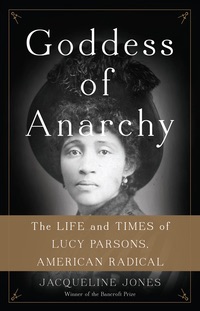By Louis J. Kern
A judicious reconsideration of the life of Lucy Parsons, this volume also offers a biographical sketch of Albert Parsons, a discussion of the radical labor movement—its organizations, publications, strikes and revolt—and the suppressive activities of corporate and governmental entities.
At the outset, an unconventional love story: Albert Parsons, a Confederate veteran and Lucia Carter, a former slave were married in 1872. Albert had opportunely become a Republican functionary in Reconstruction Texas, but when the Democratic Party resumed control, life as a mixed-race couple became untenable, and they fled to Chicago in 1873. There they reinvented themselves; she became Lucy Eldine Gonzalez Parsons of Mexican-Native American rather than African-American heritage, and he reclaimed his colonial New England ancestors, and they built a joint career as champions of the urban white working class, initially as socialists then as anarchists. Though Albert had promoted Black civil rights in Reconstruction Texas, neither he nor Lucy gave much attention to racial issues locally or nationally.
Increasingly radicalized by labor’s failures they became outspoken advocates of direct action against capitalist abuses. Consequently, when a bomb killed a policeman during the Haymarket demonstrations in 1886, Albert and seven others were found guilty of conspiracy and accession to murder; Albert and three others were hanged in 1887. While Lucy had been active as a radical labor agitator and defender of female textile workers from 1877, she built a national reputation as a fervid speaker, editor and publisher of alternative periodicals, a vehement defender of absolute free speech and freedom of assembly, and a gifted writer after Albert’s death. Indeed, as Albert noted, she was the co-author of his Anarchism: Its Philosophy and Scientific Basis as Defined by Some of Its Apostles (1887).
Lucy maintained a seamstress shop, Parsons & Co., during Albert’s lifetime, but as a single widowed mother, Lucy supported herself and her children by selling anarchist pamphlets and broadsides, relentlessly hawking copies of Anarchism, occasional peddling, and undertaking several national speaking tours. As Jones notes, she was the only other widely popular African-American speaker besides Frederick Douglass.
Jacqueline Jones’ Lucy reveals the contradictions between public and private woman. Foremost was denial of her blackness and lack of empathy for the condition of African Americans. Despite her rhetoric and anti-government creed, she denounced the anarchist attack on Henry Clay Frick and the assassination of President McKinley, and she used the legal system to settle personal disputes. Most notably, although she took several lovers, she maintained the public image of a conventional wife and mother while she had her recalcitrant son institutionalized for twenty years. Indeed, her conflict with Emma Goldman sprang largely from the latter’s enthusiastic advocacy and practice of free love.
Jones (ΦBK, University of Delaware) considers Lucy the most popular radical female orator of her generation, but overlooks “Red” Martha Biegler considered the greatest orator of Bughouse Square. She briefly compares Lucy to Ida B. Wells and Voltairine de Cleyre, but a more detailed consideration of the latter would have been fruitful. Like Lucy, Voltairine fled an oppressive past (a convent), reinvented herself, published widely, and lectured as an anarchist and defender of free speech. Unlike Lucy, she was an avowed atheist and an ardent advocate of women’s rights (Cf. “Sex Slavery” [1895]).
Goddess of Anarchy provides a fascinating picture of Lucy Parsons the woman rather than the revered labor agitator. The what of her life in its fundamental humanness is revealed if the why must perhaps forever be elusive. Those seeking more information might profitably consult Gale Adams, Lucy Parsons: Freedom, Equality and Solidarity: Writing and Speeches, 1898-1937 (2004) and Franklin Rosemont and David Roediger, eds., Haymarket Scrapbook, 25th ed. (2011).
Louis J. Kern (ΦBK, Clark University) is professor emeritus of history at Hofstra University. Hofstra University is home to the Omega of New York chapter of Phi Beta Kappa.




